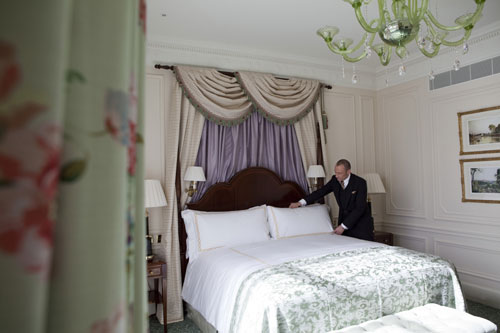English butlers in demand by Asia's super-rich
Updated: 2011-12-14 09:31
(China Daily)
|
|||||||||||
BELFAST, United Kingdom - English butlers, synonymous with Reginald Jeeves in the novels of P.G. Wodehouse, are answering more calls from super-rich Chinese and Russian clients as wealth shifts from west to east.
|
 |
|
According to training academies and employment agencies, enrollment and job placement for butlers are increasing as more clients in developing economies are looking for trained professionals to complement their villas.[David Levenson /Bloomberg] |
The Guild of Professional English Butlers has trained 20 percent more butlers this year than last, placing them with clients as soon as they are ready, according to Robert Watson, head of the guild in southern England, last week. The number of domestic staff members registered with Greycoat Placements has tripled over the past three years, Managing Director Debbie Salter said.
"Demand is outstripping supply," Watson said by telephone. "We deal with people who often are cash rich and time poor. The credit crunch did affect things for a time, but before you get rid of the butler, get rid of the Ferrari."
As Europe struggles with a debt crisis and the United States tries to revive its economy, burgeoning growth in emerging markets is boosting spending on luxuries like never before and creating opportunities for more people to look after them.
The number of millionaires in 10 major Asian economies will more than double to 2.8 million by 2015, according to a Julius Baer Group and CLSA Asia Pacific Markets report on Aug 31. China's economy grew 9.1 percent in the third quarter from a year earlier, compared with a US growth of 1.5 percent.
Mulberry Group PLC, an English maker of luxury bags and accessories, said last Thursday that first-half pretax profit more than tripled as sales in the Asia-Pacific region grew more quickly than in any other area.
Chinese clients
"We have been doing a lot of business in China particularly," said Robert Wennekes, chairman of The International Butler Academy, which trains servants in formal white gloves and tails at a castle in the Netherlands. "Every month for the past 15 months, I have been travelling from Amsterdam to China to service our clients there."
Watson estimated that his company trains more than 1,000 butlers a year and around a fifth of those go into personal service for the wealthy, with the remainder at hotels.
The demand for placing butlers in the homes and yachts of the wealthy increased about 20 percent this year, according to Sebastian Hirsch, owner of Butler For You, a company registered in Berlin that places household staff members across Europe. Hirsch has 30 percent more butlers on his books this year.
Sara Vestin, director of Bespoke Bureau, Peek-a-boo & Cupcakes Domestic Staff & Nanny agencies in London, said her company trained 52 butlers this year, up from 20 last year, and they all got jobs. The highest paid placement was for 101,500 pounds ($158,390) in the United Arab Emirates, she said.
'Win-win'
"Everyone looking for a job who is accepted on the training with us will get a job," Vestin said by e-mail. "There are a lot of people looking to hire butlers and there is a shortage of them, so for us it's a win-win situation."
Butlers undergo a month-long training program that includes instruction on food and wine service and "second guessing" what their employer wants, said Watson. It costs trainees about 8,000 pounds for the live-in package.
The butler's place in English society reached its peak during the increasing affluence of the Victorian era, when having a butler was "considered essential for those aspiring to gentility", according to The Rise and Fall of the Victorian Servant, a book written by Pamela Horn and published in 1975.
"In most families the office of butler was one which commanded respect and even awe," Horn wrote. "The aim was to provide service as quietly and efficiently as possible."
Fewer butlers
In 1911, some 800,000 British homes had servants, following World War I the numbers dropped as new career paths opened and social attitudes changed, according to Horn. By 1969, the number of male servants fell to 12,000 in the United Kingdom, declining further over the subsequent four decades. There are now about 8,000 butlers in the UK, Hirsch at Butler For You estimated.
The role of the modern butler is now closer to that of a personal assistant, helping organize an employer's daily agendas, as well as offering advice on etiquette, with discretion a must, said Watson.
Greycoat Placements, also based in London, has about 20,000 people on its books today, three times more than in 2008, Salter said. Butler placements by the company grew about 20 percent this year from 2010, she said.
The demand has been driven partly because of a growing number of Chinese clients needing butlers for their second homes in London, said Laura Harrall, a director at Greycoats.
"Asia is coming up pretty strong now," Watson said. "We are getting lots of inquiries from these Chinese who are sitting on piles of money. They are discovering that if you spend $8 million on a villa with marble flooring, you need someone to come along who knows what they are doing."
Bloomberg News
Related Stories
Auction to feed craving for high-end help 2011-02-15 08:01
保姆 domestic helper 2011-01-05 12:56
- Govt to act as export expansion slides
- Court: Shenzhen company is owner of iPad trademark
- Nuclear approvals may restart
- MOC scraps duties on abrasion-resistant paper
- Sinopec, ENN bid for China Gas
- Haitong delays its $1.7b offering in HK
- Fishermen sue ConocoPhilips for compensation
- MOC conditionally OKs Seagate-Samsung deal








